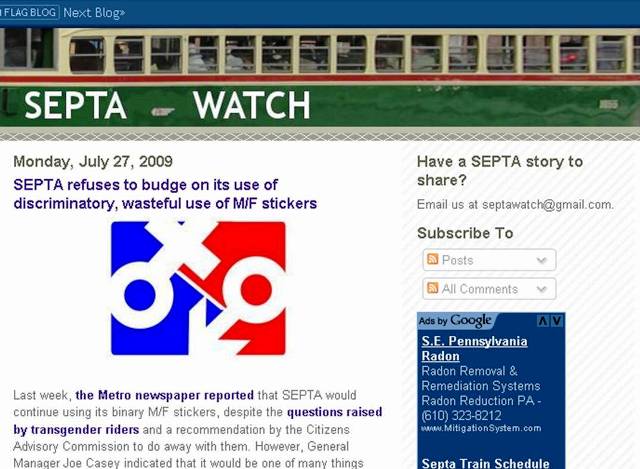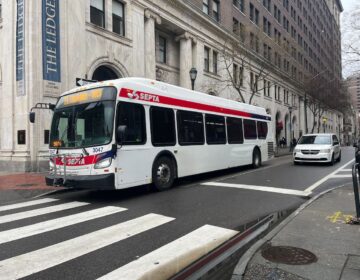This blogger has transit in his sights

July 27
By Anthony Campisi
For PlanPhilly
While watching the trolleys go by from a porch outside a West Philadelphia café, Michael Froehlich wonders aloud why he started writing about public transportation.
First, he muses, there is the public policy appeal: fostering walkable communities, reducing urban sprawl, cutting down on greenhouse gas emissions.
Then, of course, is the fact that he gets to talk about “big, cool pieces of machinery.”
Froehlich tries to focus on both sides of mass transit at his hit blog SEPTA Watch, which has caught the attention of the Philadelphia transit community.

Michael Froehlich and daughter Zora
Despite no formal training in journalism, his blog has gotten attention from the mainstream media, trainiacs and SEPTA employees and management.
Froehlich writes about everything from suggestions for how the authority could avoid losing money because of West Philly El shutdowns ( http://septawatch.blogspot.com/2007/08/modest-proposal-to-improve-el-shuttles.html ) — he thinks passengers should have to pay to use the 40th Street El station — to quips about SEPTA cashiers’ propensity to take unannounced bathroom breaks (http://septawatch.blogspot.com/2008/03/where-everyone-can-ride-for-free.html ).
And the powers that be have taken notice.
SEPTA administrators began reaching out to him a few months after he started the blog in April 2007, and he has gotten feedback from SEPTA board members. He gets the authority’s press releases, and many of the 10,000 page views Froehlich’s site gets a month — he can’t track the number of people who read him through their RSS feeds, which would push that number higher — come from SEPTA engineers, conductors and others who work at 1234 Market St.
Since he has no formal training in transportation engineering — he studied political science at Haverford and, when not chronicling the region’s transit system, works as a legal aide lawyer — he says he’s grateful when SEPTA employees point out technical mistakes he’s made.
He remembers one instance in which he criticized SEPTA for delaying trains because of leaves that had fallen on regional rail tracks (http://septawatch.blogspot.com/2007/11/de-leaving-rails.html). He wondered how could train cars weighing more than 60 tons be stopped by a pile of autumn leaves.
But after looking at the response to that post, he had to temper his criticism — apparently, when trains crush leaves a slippery oil is released that can cause a hazard and has to be cleaned off the tracks.
Yet Froehlich doesn’t want his site to become the exclusive domain of transit geeks, like the forums at railroad.net (http://www.railroad.net/forums/index.php), where a recent thread centered around identifying Amtrak locomotives by model number (http://www.railroad.net/forums/viewtopic.php?f=46&t=33730 ). Instead, he got into the blogging business to advocate for average SEPTA riders and tell their stories.
He has a keen eye for detail. Riding the Route 34 trolley to work every morning, he notices that that trolley cars’ racial composition changes depending on the time of day. Before 7 a.m., he finds that the trolleys are almost totally populated by black West Philadelphians, while during the morning and evening rush hours trolley riders are about 60 percent white.
He says that such granular coverage focusing on the rider experience has been lacking in the mainstream media. That’s why he harps on problems that The Philadelphia Inquirer and the Daily News have ignored — like the piles of trash left on the trolley tracks at 30th Street (http://septawatch.blogspot.com/2009/04/trash-at-30th-street.html). Though the majority of SEPTA riders might not be interested in the details of how the overhead catenary lines power the authority’s trolleys and trains, they do care that they can’t buy tokens at the Race-Vine Broad Street Line station.
At the same time, Froehlich doesn’t want to be overly negative. Growing up in Pittsburgh and living on the West Coast for a few years after college, he knows first-hand that Philadelphia has one of the most extensive transit systems in the country. A big believer in mass transit — he doesn’t own a car and never wants to buy one — his stated goal is to push for transit improvements.
While he doesn’t expect the authority to be perfect, he does want it to do a better job of keeping riders in the loop when problems occur. One particularly irate post last year focused on one of his morning commutes in which SEPTA delayed service to his trolley stop — but hadn’t told people waiting for the trolley that one wasn’t coming (http://septawatch.blogspot.com/2009/01/delaying-34-trolley-without-explanation.html). That type of behavior, he says, only serves to alienate riders who want to know about problems so they can plan for them.
On the other hand, Froehlich is happy with the changes he’s seen since Joe Casey took over as general manager, calling it “a completely different agency.” He lauds Casey for an increasing emphasis on customer service. Readers now forward him e-mail exchanges they’ve had with SEPTA customer relations staff in which the authority has responded professionally and quickly to their concerns.
At the same time, his relationship with SEPTA management is difficult to quantify. He’s the highest-profile blogger devoted to the authority, which keeps tabs on the blogosphere, and has been invited to tour SEPTA headquarters and meet Casey.
Though he says that he’s pleased by the authority’s efforts to reach out to him, he’s displayed ambivalence on his blog (http://septawatch.blogspot.com/2008/03/septa-watch-also-very-funny.html ) about taking SEPTA up on its offers, quoting a study on transit bloggers that he said described its attitude toward him as “kill [him] with kindness. … Though occasionally annoying, it’s worth trying to get this person on one of your citizen committees and taking their calls.”
The upside of running a niche blog like SEPTA Watch is that Froehlich can help publicize issues that wouldn’t get extensive coverage in the city’s two papers. The Economy League of Philadelphia, for instance, has made it a policy to reach out to bloggers like Froehlich and provide them with information and story ideas.
While The Inquirer and Daily News have to appeal to larger audiences and may not have the manpower or time to deeply cover the league’s issues concerning economic development, a handful of area bloggers spend their time writing about precisely those topics.
The league made an effort to reach out to SEPTA Watch as part of its effort to fight Plan B, a doomsday budget proposal that would have gutted SEPTA if it hadn’t received funding from Harrisburg that it sought, Economy League spokeswoman Allison Kelsey said.
“It’s working for us so far,” she said.
At the same time, SEPTA Watch doesn’t just try to provide newspaper-quality coverage and commentary. Froehlich also uses the site to indulge his penchant for whimsy. He intersperses his commentary and news with links to old videos of SEPTA on YouTube that readers send him (http://septawatch.blogspot.com/2008/08/septa-trolley-videos-from-50s.html) and is fascinated by the more off-beat aspects of running a large public transportation agency — like the number of Philadelphians who die in bus and rail accidents each year.
Though Froehlich tries to submit four or five posts a week, that number has dropped noticeably since his daughter, Zora, was born five months ago. Taking care of her hasn’t totally stopped his work on the site — he took Zora to the Google Transit press conference and brought her along, baby wrap and all, to an interview with a reporter. But when he comes off paternity leave at the end of August, work will start eating into his time again.
“I’ve got all these other things going on in my life,” he says, noting the work at his other creation, the West Philly Tool Library, which lets West Philadelphians borrow home-improvement tools for a nominal membership fee.
To better manage his time, he’s in talks with a group of riders to bring in more writers for the site. He would also like to expand coverage to New Jersey Transit and PATCO. And if he could do it all over again, he says that he would have given the blog a more expansive focus from the start — an avid biker, he would have liked to spend more time covering other regional transportation issues.
“SEPTA Watch … scratches the surface,” he says.
Contact the reporter at campisi.anthony@gmail.com
WHYY is your source for fact-based, in-depth journalism and information. As a nonprofit organization, we rely on financial support from readers like you. Please give today.





